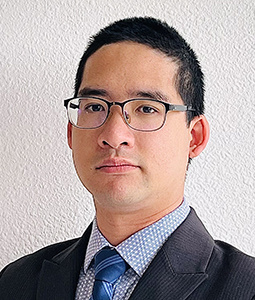Molinaroli College of Engineering and Computing
- SC.edu
- Study
- Colleges and Schools
- Molinaroli College of Engineering and Computing
- Faculty and Staff
- Shyuan (Jeffrey) Cheng
Faculty and Staff
Shyuan (Jeffrey) Cheng
| Title: | Assistant Professor |
| Department: | Mechanical Engineering Molinaroli College of Engineering and Computing |
| Email: | shyuan@mailbox.sc.edu |
| Office: | 300 Main Room A116 |
| LinkedIn: | My LinkedIn profile |
| Resources: | My Website My CV Google Scholar Research Gate ORCID |

Education
- Ph.D., Mechanical Science and Engineering, UIUC, 2019-2024
- M.S., Mechanical Science and Engineering, UIUC, 2018-2019
Background
Dr. Cheng’s research leverages advanced experimental techniques, including 2D, stereo,
and volumetric particle image velocimetry (PIV), particle tracking velocimetry (PTV),
and digital image correlation (DIC), to investigate turbulence dynamics and complex
fluid-structure interaction systems. His research interest encompasses renewable energy
applications in wind and tidal power, complex fluid-structure interaction with bio-inspired
designs, and turbulence dynamics of various flows.
Dr. Cheng earned his M.S. and Ph.D. degrees in Mechanical Science and Engineering
from the University of Illinois at Urbana-Champaign.
With over 30 peer-reviewed publications and over 30 conference presentations, Dr.
Cheng has been recognized with several accolades, including two Grainger Engineering
Conference Presentation Awards and the James O. Smith Memorial Outstanding TA Award.
Awards
- Taiwan Engineering Graduate School Scholarship Program Winner - 2021, 2022
- Grainger Engineering Travel Award - 2021, 2022
- James O. Smith Memorial Outstanding TA Award - 2023
Research Overview
My research addresses critical engineering challenges in systems shaped by environmental
factors, with a central focus on turbulence–structure interactions. Using advanced
experimental diagnostics—including Particle Image Velocimetry (PIV), Particle Tracking
Velocimetry (PTV), Digital Image Correlation (DIC), and custom force measurement systems—I
work to uncover fundamental flow physics, develop predictive models, and translate
insights into practical engineering solutions.
Five core research areas guide my efforts:
- Wind and marine energy systems – optimizing performance and resilience of renewable energy technologies.
- Flow control and turbulence dynamics – uncovering strategies to manipulate and mitigate turbulent flows.
- Bio-inspired engineering – translating natural fluid–structure interactions into innovative design solutions.
- Geophysical and environmental fluid systems – modeling and understanding complex natural flows and sediment processes.
- Experimental and theoretical methods in fluid mechanics – advancing high-fidelity diagnostics and reduced-order modeling approaches.